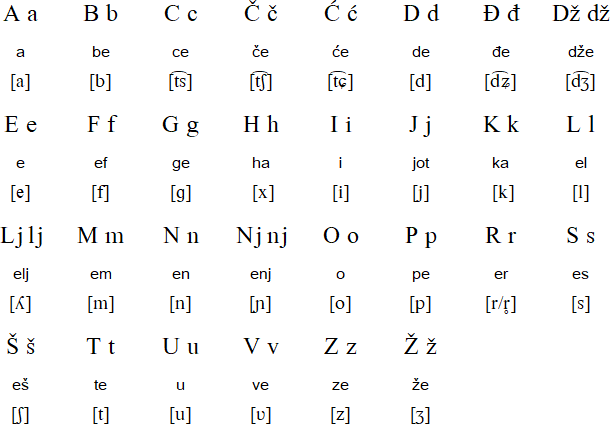Online Language Learning
Hrvatski jezicni portal is a Croatian dictionary database portal. In order to access it, search Hrvatski jezični portal - Znanje, and select the website http://hjp.znanje.hr/.
Goethe Language Tests is an online tests for beginning and advanced level Croatian language students.
Learn Croatian is a great resource if you're trying to learn Croatian you will find some useful resources including a course about adjectives, adverbs, articles, feminine, negation, nouns, numbers, phrases, plural, prepositions, pronouns, questions, verbs, vocabulary, exercises to help you with your Croatian grammar all this is free of charge.
Croatian vs. Serbian
Is there a difference between Croatian and Serbian beyond the alphabets? Take a look at this brief lecture by Branco Franoli of Trinity College, online here. The tables with comparative vocabulary give a brief overview on some of the differences between the languages.
Croatian Alphabet
Origin
Croatian is a South Slavic language spoken mainly in Croatia, Bosnia and Herzegovina, the Serbian province of Vojvodina and the neighbouring countries by about 5.5 million people.
The oldest texts in Croatian date back to the 11th century and were written in the Glagolitic alphabet, mainly in Croatia. The earliest text in the Latin alphabet dates from 1345. The Glagolitic alphabet was eventually replaced by the Latin alphabet in Croatia.
Up to the mid 19th century there was no standard written form of Croatian, but there was extensive literature in different dialects.
The Croatian Latin was mostly designed in 1835 by Ljudevit Gaj, a Croatian linguist, who based it on the Czech and Polish alphabets. Today his alphabet is used in Bosnia and Herzegovina, Croatia, Montenegro and Serbia, and variations of his alphabet are used for Slovene and Macedonian.
Croatian contains many words of Latin and German origin. Many new Croatian words are created by combining and adapting existing ones.
Croatian is closely related to and mutually intelligible with Serbian, Bosnian and Montenegrin. For more information see an article about Serbo-Croatian language issues.

G.L.O.S.S.
G.L.O.S.S. or the Global Language Online Support System has some great materials to keep your language skills up to speed. There are radio reports, individual grammatical lessons on counting, dates, etc and much more. Many of the sections will introduce specialized vocabulary in areas such as politics, economics, etc.
Hrvatski Jezicni Portal
One of the most complete and easy-to-use dictionaries on the web can be found here at the Hrvatski Jezicni Portal. In order to access it, search Hrvatski jezični portal - Znanje, and select the website http://hjp.znanje.hr/. The dictionary entire are very thorough with etymological information along with complete definitions, onomastics, etc. The dictionary boasts some 116, 506 basic words and has been drawn from the following works:
- Rječnik hrvatskoga jezika V.Anić (I. izdanje 1991, II. izdanje 1994, i III. izdanje 1998)
- Pravopis hrvatskoga jezika V. Anić – J. Silić (2001)
- Veliki rječnik hrvatskoga jezika V. Anić (2003. priredila Ljiljana Jojić)
- Kronologija – Hrvatska, Europa, Svijet (grupa autora, urednik I. Goldstein)
- Rječnik stranih riječi Anić – Goldstein (I. izdanje 1998, II. izdanje 2000)
- Hrvatski enciklopedijski rječnik (uređivački odbor: prof. dr. Vladimir Anić, prof. dr. Ranko Matasović, prof. dr. Ivo Pranjković, dr. Dunja Brozović Rončević, prof. dr. Ivo Goldstein, Slavko Goldstein, mr. Ljiljana Jojić, Ljiljana Cikota; 2003)
Finding Translations
Wondering if your favorite English language novel has ever been translated? Index Translationum is one of the best sources for such information. You can search any number of fields - just author, title word, country of publication, translator, etc. You just need to specify the original language of publication and the language you are seeking to get a list of any and all translations. This was originally a printed publication and can be very helpful if you want to know if something was ever translated. The site, like its published version, is sponsored by UNESCO.
